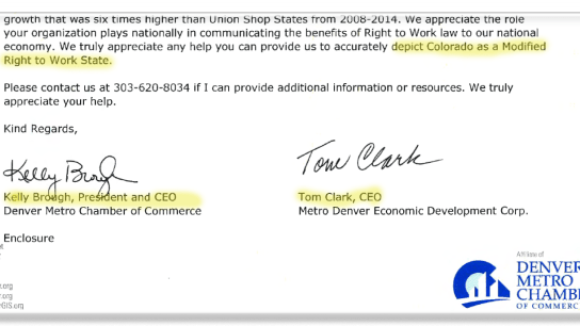Teamsters Threaten Employee, NRTW Files Charges in Defense
Teamsters union officials unlawful actions continue to keep National Right to Work Legal Defense attorneys busy. Over the past several decades…
Colorado union bosses try to justify forced-union dues, and their opposition to a state Right to Work law, by claiming that all employees “benefit” from forced-union representation.
But here is a clear case (one of an increasing number) where the school board wants to offer a substantial pay increase to a significant number of teachers in fields where there’s a shortage, and the union bosses oppose it and can almost certainly block it. Without a union, math and science teachers would get paid more next year than they actually will get paid with a union monopoly-bargaining agent. How are they benefiting? Forcing such teachers to pay union dues, even when they don’t belong to the union, adds insult to injury.
According to the Rocky Mountain News:
Denver Public Schools is eager to offer the largest annual pay increase in memory to its classroom teachers – one of its proposals would hike base salaries an average of 7.7 percent.
There’s more. With incentives available through the ProComp performance-pay system, average salaries, the district calculates, would rise by a jaw-dropping 18 percent.
Given the slumping economy, stagnating wages in the private sector and the fact that salaries at other local school districts may not keep pace with inflation, you’d think the Denver Classroom Teachers Association would be all over the offer. Instead, the union has flatly rejected it.
The district’s three-year-old ProComp program is the sticking point. All new hires are covered by ProComp, which is building up a sizable reserve from a tax approved by voters. The district wants to use that revenue to sweeten its incentive-based pay, such as for those who teach difficult subjects in hard-to-staff schools. It also wants to direct more money to teachers who are early in their careers.
The union instead is insisting that a new contract largely preserve the current salary structure, which gives a larger slice of the compensation pie to senior teachers and funnels less money into incentives.

Teamsters union officials unlawful actions continue to keep National Right to Work Legal Defense attorneys busy. Over the past several decades…

Pretending to Be Right to Work Won’t Suffice; Does Denver Business Establishment Regret Big Labor Appeasement? (source: National Right…

Program Maximizes Right to Work Gains in ‘Year of Opportunity’ (Source: November-December 2014 National Right…